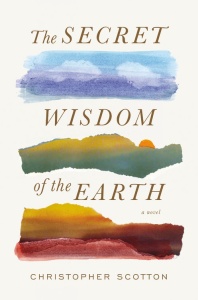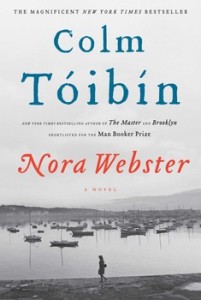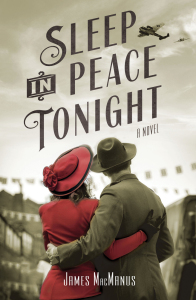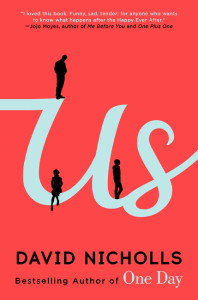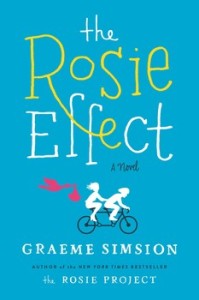 The Fatherhood Project (New York City, present-day): Judge this warmhearted book by its winning cover! By page 290, 84.30232% read – a detail to honor Don Tillman, the beloved forty-year-old genetics professor first introduced in The Rosie Project – I found myself laughing out loud. Up until then, I’d been smiling, chuckling, marveling, and shaking my head at the antics and witty prose echoing Don’s gifted scientific mind and “general oddness,” but now I was laughing like crazy. Not at Don, but with Don: at the absurdity of predicaments he digs himself into in the name of love for:
The Fatherhood Project (New York City, present-day): Judge this warmhearted book by its winning cover! By page 290, 84.30232% read – a detail to honor Don Tillman, the beloved forty-year-old genetics professor first introduced in The Rosie Project – I found myself laughing out loud. Up until then, I’d been smiling, chuckling, marveling, and shaking my head at the antics and witty prose echoing Don’s gifted scientific mind and “general oddness,” but now I was laughing like crazy. Not at Don, but with Don: at the absurdity of predicaments he digs himself into in the name of love for:
Rosie, “the world’s most beautiful woman,” Don’s wife of 10 months and 10 days, who throws his rigorously structured-for-maximum-predictability-and-success world topsy-turvey when she announces an unplanned pregnancy. Even her phrasing of “we’re pregnant” sends Don into a tizzy – literal thinking one of his trademarks – and begins unraveling his fledgling albeit “incredible” marriage.
Don, who sees life as “scientific problems to solve,” immediately seizes upon the news with characteristic intellectualizing, concluding that his task is to protect Rosie from undue stress that would raise her cortisone levels, which would be harmful to the “Baby Under Development” or B.U.D. Thus setting off our intrepid protagonist on a series of crazy incidents, in this once again charming novel by Australian author Graeme Simsion.

Hudson River, New York City
(MarkBurnett at en.wikipedia [GFDL
or CC-BY-SA-3.0], via Wikimedia Commons)
My mildly hysterical reaction was sufficient proof that this sequel is as good as/maybe better than the first. Fresh humor and clever prose only partly the explanation. So, in a manner befitting our list-making hero, let me enumerate why:
- Don Tillman may be the most self-aware and accepting of his human imperfections than anyone you’ll ever meet. He recognizes his “innate logical skills” are far superior to his social ones, consequently he’s “extremely experienced at dealing with embarrassment resulting from insensitivity to others.” Still, with enough concentration, research, and practice, which he is willing to expend in copious, intense amounts, he can achieve successful outcomes. Prime example: Rosie, whom he won over executing the Wife Project. Don loves Rosie deeply, but he has a hard time expressing his feelings. Although, he’s been quick to hide a few meltdowns, Rosie, impulsive and disorganized, the complete opposite of Don, surely knows his “limitations.” (She “encouraged me to look beyond my limitations, was the reason for my life being more than I had ever envisioned.”) One of the sage offerings is that just because you’re socially challenged, doesn’t mean you lack feelings or can’t feel emotional pain. In a rare moment of anger, Don shares his frustration with a:
“whole world of people who do not understand the difference between control of emotion and lack of it, and who make a totally illogical connection between the inability to read others’ emotions and inability to experience their own. It was ridiculous to think that the pilot who landed the plane safely on the Hudson River loved his wife any less than the passenger who panicked.”
- Don allows himself to get mixed up in numerous situations that are not in his best interest, but he’s a man of integrity. Case in point: the Gene Sabbatical. Gene, who Don lists in the opening as one of his “total of six friends,” is Rosie’s thesis advisor from Melbourne (in the midst of his own Gene and Claudia Marriage Problem; Claudia, a clinical psychologist, is also on Don’s list of friends), has temporarily moved into Don and Rosie’s Manhattan apartment. Despite the awkwardness of the arrangement and the disruption to their marriage, Don’s ethos means he cannot turn away his friend, whom Rosie dislikes because of his boastful extramarital affairs. Gene just so happens to be another of the many psychologists (evolutionary psychologist) in the novel – meaningful given the “oddness” of Don’s persona and professional attempts to label him. The lay reader may perceive Don as an extremely high-functioning man with Asperger’s syndrome, but Don cautions us that “humans consistently over-recognize patterns and draw erroneous conclusions based on them.” He’s been misdiagnosed as “schizophrenic, bipolar, an OCD sufferer,” which highlights dangers in stereotyping. His friends understand him well, leading to an overabundance of goodwill and support. Their affirmation, helpfulness, and warmth is what we all wish for in our friends. Don, then, is not someone we look down upon. Rather, we admire his gifts and good-naturedness, which is why we care about the mess he’s gotten himself into.
- Safeguarding Rosie and proving he’s capable of fatherhood have increased Don’s alcohol consumption. This wreaks havoc on his BMI, which Don estimates for everyone he meets the way the rest of us might guestimate someone’s age. This habit is consistent with his fixation on healthy eating, which he takes to extreme lengths to assure a nutritious regimen for Rosie and their unborn child. Constantly advising Rosie what to eat/not to eat is a bad prescription for an expectant mother, one with her own nutty dietary preferences (she’s a “sustainable pescatarian”). Don’s solution is the Pregnancy Version of his Standardized Meal System plus a Banned Substances List, but reducing caffeine and munching on tofu are not what a thesis-pressured, pregnant woman craves! The absurdity of it all emphasizes the importance of wholesome eating during pregnancy and throughout the life span.
- Halfway through the novel I felt a pang of genuine sadness for Don, because of the real prospect he could lose his one true love. Hence, beware labeling this novel pure “rom-com.” Within the comic are poignant life lessons. A few more:
- Don: “I have a theory that everyone is as odd as I am when they are alone.”
- Don on bullying: “Highly intelligent people are often bullied. As a result of being different.”
- Playground Incident: When Don attempts to understand children’s behavior by observing play in a playground, his behavior may seem out-of-the-ordinary, but it’s not “against the law to be awkward.”

Highline, New York City
(Mark Palumbo at Flickr,
[CC-BY-2.0])
Lorraine
